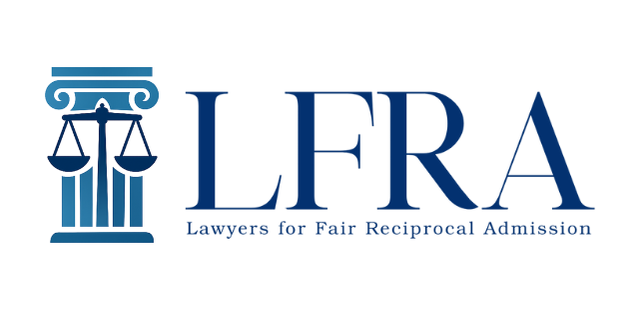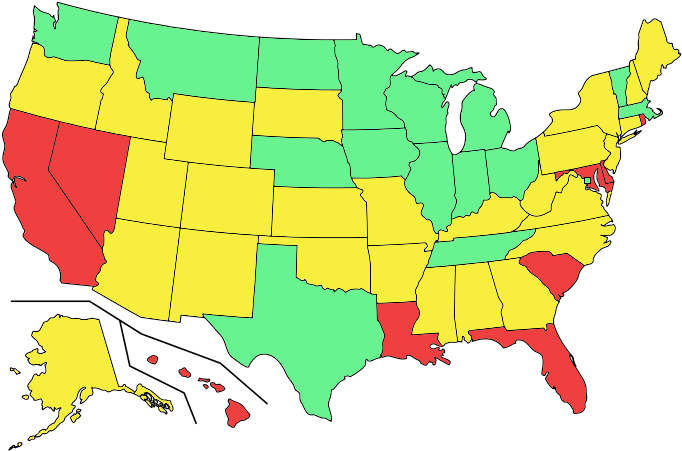State Admission on Motion and Tit-for-Tat Admission
This map highlights 26 states that restrict admission on motion to experienced attorneys based on tit-for-tat reciprocity—only granting access if the applicant’s home state offers the same. LFRA is especially interested in hearing from attorneys affected by these rules, including those in California who cannot move elsewhere, or out-of-state attorneys who cannot gain admission in California. We are prioritizing potential challenges in Arizona, Pennsylvania, and New Jersey but are open to other jurisdictions.
Recent Supreme Court precedent makes clear that such protectionist policies are unconstitutional. These rules admit novice attorneys from “reciprocal” states while forcing more experienced lawyers from non-reciprocal states to retake the full bar exam. This discrimination has no legitimate basis related to attorney competence and serves only to protect local economic interests—an impermissible goal under the Constitution.
Reciprocity for admission on motion to the state bar, by sort in the United States
Sort of reciprocity:
Pure (comity): Green
Tit-for-tat: Yellow
No reciprocity (no admission on motion): Red
Does your state implements Reciprocal admissions?
Pure (comity): District of Columbia, Illinois, Indiana, Iowa, Massachusetts, Michigan, Minnesota, Montana, Nebraska, North Dakota, Ohio, Tennessee, Texas, Washington, Wisconsin.
Tit-for-tat: Alabama, Alaska, Arizona, Colorado, Connecticut, Georgia, Idaho, Kansas, Kentucky, Maine, Mississippi, Missouri, New Hampshire, New Jersey, New Mexico, New York, North Carolina, Oklahoma, Oregon, Pennsylvania, South Dakota, Utah, Vermont, Virginia, West Virginia, Wyoming.
No reciprocity (no admission on motion): California, Delaware, Florida, Hawaii, Louisiana, Maryland, Nevada, Rhode Island, South Carolina.
Unconstitutional “tit for tat” State Laws
Arizona Supreme Court Rule 34(f) grants bar admission without examination to certain government attorneys, creating a special exemption based solely on employment status. While framed as a public service measure, this rule undermines the principle of uniform standards by allowing a politically favored class to bypass the rigorous vetting required of other attorneys. Licensure should reflect merit and demonstrated competence—not job title.
This carve-out is especially troubling given Arizona’s continued refusal to offer broad admission on motion to experienced out-of-state attorneys. By waiving standard requirements for select government lawyers while holding others to stricter rules, Rule 34(f) creates a two-tiered system that erodes public trust and threatens the integrity of the legal profession. LFRA urges Arizona to abandon this unequal policy and reaffirm its commitment to fairness and reciprocity in bar admission.
California Assembly Bill 1522 threatens fair and reciprocal bar admission by creating a special license pathway for a narrow group of federal government attorneys, bypassing the California Bar Exam based solely on their employment status as of January 20, 2025. This approach undermines long-standing competency standards and allows political timing, not merit, to dictate who gains access to the legal profession.
At a time when California denies admission on motion to many qualified out-of-state attorneys due to non-reciprocity, AB 1522’s targeted carve-out creates a two-tiered system favoring a politically connected few. LFRA strongly opposes this bill, urging California lawmakers to maintain equal, merit-based standards for all attorneys regardless of employer or political ties.
New Jersey’s Pro Hac Vice rule (Rule 1:21-2) creates unequal treatment by allowing out-of-state attorneys to practice temporarily for a $200 fee while restricting permanent admission to those from reciprocal jurisdictions. This pay-to-play system favors wealthier clients and limits fair access to justice, undermining the principles of equal opportunity in the legal profession.
This inconsistent approach raises constitutional concerns under Supreme Court of New Hampshire v. Piper, 470 U.S. 274 (1985), which prohibits discriminatory barriers against non-resident lawyers. LFRA argues New Jersey cannot both restrict full admission and profit from temporary practice fees—such protectionism is legally vulnerable and violates the Privileges and Immunities Clause.
Sources:
National Conference of Bar Examiners Comprehensive Guide to Bar Admission Requirements 2021 (NCBE 2021), https://www.americanbar.org/content/dam/aba/publications/misc/legal_education/2021-comp-guide.pdf; barreciprocity.com, https://barreciprocity.com/reciprocity-admission-on-motion/.
New Jersey Courts – Pro Hac Vice Admission Rule:
New Jersey Courts. Pro Hac Vice Admissions. Accessed June 30, 2025. https://www.njcourts.gov/attorneys/mcl/prohacvice
Supreme Court of New Hampshire v. Piper, 470 U.S. 274 (1985):
Supreme Court of New Hampshire v. Piper, 470 U.S. 274 (1985). https://supreme.justia.com/cases/federal/us/470/274/
California Assembly Bill (AB) 1522 Summary
FastDemocracy. CAB00035883 (2025–2026 Session). Accessed June 30, 2025. https://fastdemocracy.com/bill-search/ca/2025-2026/bills/CAB00035883/#summary-menu
Proposed Rule Text under Westlaw – Government Regulations
Westlaw, AZRules Document NA8FEF7E153D711EE9494FE5A5388BB1F (Full Text View). Accessed June 30, 2025. https://govt.westlaw.com/azrules/Document/NA8FEF7E153D711EE9494FE5A5388BB1F?viewType=FullText&originationContext=documenttoc&transitionType=CategoryPageItem&contextData=(sc.Default)&bhcp=1




